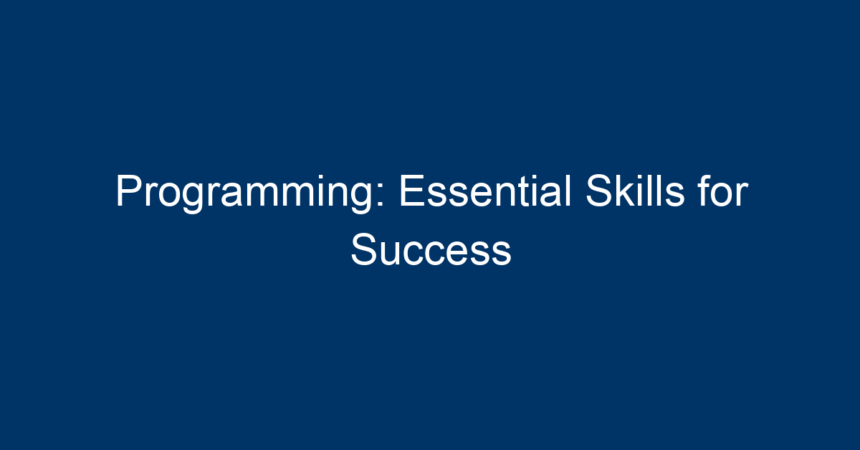In the digital age, the importance of programming cannot be overstated. As businesses and individuals increasingly rely on technology, programming emerges as a vital skill that opens numerous doors. Whether you’re aiming for a career in software development or simply want to understand the digital landscape, mastering programming is essential. In this article, we will explore the fundamental skills necessary for success in programming, equipping you with the knowledge to navigate this ever-evolving field.
Understanding the Basics of Programming
What is Programming?
Programming involves writing instructions that a computer can understand and execute. It is the way we translate logic and problem-solving skills into a language that computers can work with. Programming languages like Python, Java, and JavaScript are the tools we use to make things happen in the digital world.
The Importance of Learning Programming
Today, programming is not just for computer scientists. It is a skill that is becoming increasingly valuable across various industries. From automating tasks to analyzing data, programming enables individuals to create solutions that enhance productivity and innovation. Understanding programming concepts is crucial for anyone looking to thrive in the modern workplace.
Essential Skills for Aspiring Programmers
1. Problem-Solving Skills
One of the core competencies every programmer must develop is strong problem-solving abilities. Programming often involves breaking down complex problems into manageable parts and finding solutions. Here’s how you can enhance your problem-solving skills:
- Practice regularly: Engage in coding challenges on platforms like LeetCode or HackerRank.
- Study algorithms and data structures: Knowing how to select the right algorithm can save time and resources.
- Collaborate with others: Pair programming or group projects can expose you to different perspectives.
2. Proficiency in Programming Languages
Mastering one or more programming languages is essential. Each language has its own syntax and use cases, and being proficient in them can significantly enhance your programming capabilities.
- Python: Known for its simplicity and readability, Python is a great starting point for beginners.
- JavaScript: Essential for web development, JavaScript helps in creating interactive web pages.
- Java: Widely used in enterprise environments, Java is known for its portability across platforms.
3. Understanding of Version Control Systems
Version control is critical in modern programming workflows, especially when working on collaborative projects. Tools like Git help keep track of changes, allowing programmers to manage code revisions efficiently.
- Learn Git basics: Familiarize yourself with commands like
commit,push, andpull. - Use platforms like GitHub: Hosting your projects on public repositories increases visibility and collaboration opportunities.
4. Knowledge of Development Tools and Environments
Familiarity with development tools can boost your productivity and efficiency. Integrated Development Environments (IDEs), text editors, and debugging tools are essential components of a programmer’s toolkit.
- IDE vs. Text Editor: Understand the differences; IDEs often come with features like code completion and debugging support, while text editors are lightweight and flexible.
- Explore tools like Visual Studio Code: This popular code editor supports a wide range of programming languages with numerous extensions.
5. Understanding Databases
Database management is a crucial programming skill, especially for web developers. Knowledge of how to interact with databases can help you build more efficient applications.
- Learn SQL: Structured Query Language (SQL) is essential for managing and manipulating data in relational databases.
- Familiarize yourself with NoSQL: Explore options like MongoDB to manage non-relational data effectively.
Best Practices in Programming
1. Write Clean and Maintainable Code
Clean code is readable and efficient, making it easier for others to collaborate on your projects. Incorporating best practices will not only make your code better but also enhance your reputation as a programmer.
- Follow naming conventions: Use meaningful variable names and consistent formatting.
- Comment your code: Briefly explain complex sections of your code to help others understand your logic.
2. Test-Driven Development (TDD)
Testing is an integral part of programming that helps ensure your code works as intended. Adopting a test-driven development approach can improve your software quality and reliability.
- Write tests first: Begin with writing test cases before implementing the actual code to clarify your requirements.
- Use frameworks: Familiarize yourself with testing frameworks like JUnit for Java and PyTest for Python, which streamline the testing process.
Staying Updated in a Fast-Paced Environment
1. Continuous Learning
The tech landscape is continually evolving, and to remain relevant, it’s essential to engage in lifelong learning. Here’s how you can stay updated:
- Online courses and tutorials: Platforms like Coursera and Udemy offer a plethora of courses on various programming topics.
- Join communities: Participate in forums, hackathons, and meetups to learn from peers and industry experts.
2. Follow Industry Trends
Keeping abreast of industry trends helps you anticipate changes in the programming world. Subscribe to blogs, newsletters, and podcasts dedicated to programming and technology.
- W3Schools, Codecademy, and Stack Overflow: These platforms offer valuable insights into coding best practices and emerging technologies.
- Stay on social media: Follow thought leaders and tech companies for real-time updates and discussions.
Conclusion
In today’s technology-driven world, programming is an indispensable skill that can dramatically enhance your career prospects and problem-solving capabilities. By focusing on essential programming skills such as problem-solving, proficiency in programming languages, version control, development tools, and database management, you can set yourself up for success.
Remember, programming is not just about coding—it’s about thinking critically and finding innovative solutions. So embrace the challenge and commit to continuous learning and improvement. With dedication and practice, you can become a successful programmer ready to tackle the challenges of the digital world.
Actionable Insights
- Start by learning a programming language that aligns with your career goals.
- Engage in coding challenges to enhance your problem-solving skills.
- Explore online resources and communities to broaden your knowledge.
- Begin using version control systems to manage your projects efficiently.
- Continuously seek out new learning opportunities to keep your skills sharp.
By refining these essential skills, you’ll not only excel in programming but also become a valuable asset in any tech-driven environment. Happy coding!



